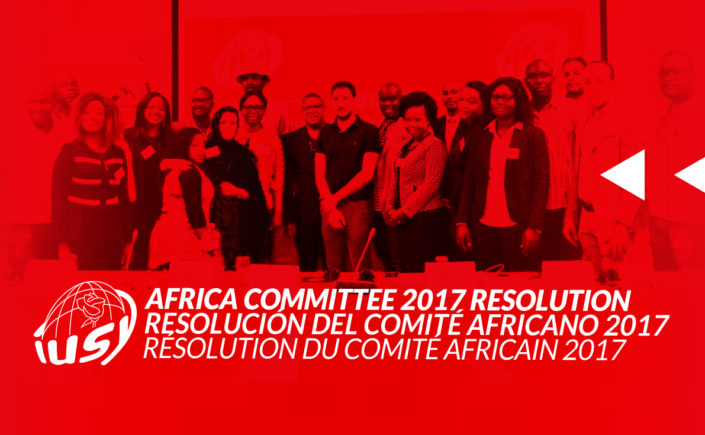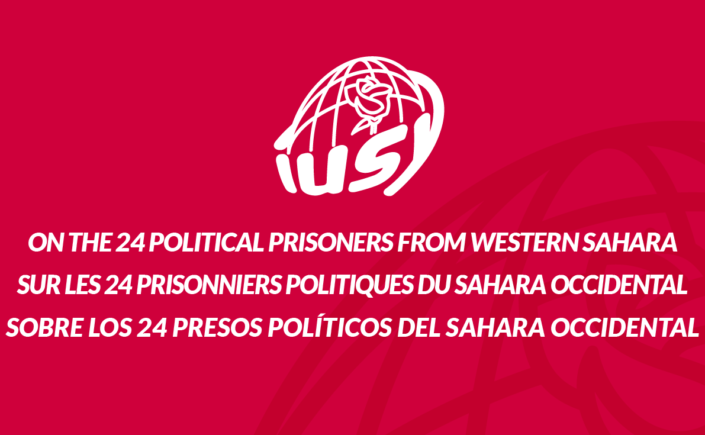The Africa Committee of the International Union of Socialist Youth held its leadership conference from the 9th to 12th November 2017 in Pretoria, South Africa, under the auspices of its Member organization – SWAYOCO. The theme of the conference was Deepening Democracy, Social Justice, and Equality in Africa.
The Africa Committee noted that the socio-economic challenges facing the continent have left a huge number of young people in a precarious position of destitution, unemployment, dwindling opportunities for education, and increased attraction to crime amongst others. The Committee also agreed that as the neo-liberal agenda takes over, the plethora of challenges facing the Continent revolve around rising inequalities, increasing extremism and terrorism, hunger, marginalization of women, discrimination based on sexuality, a backlash on democracy, and poverty.
The former IUSY President and current South African Member of Parliament and Minister of Police, Comrade Fikile Mbalula, reminded the Committee of its founding principles of promoting social justice, equality and fairness in the world. He reminded the IUSY leadership to continue to be vocal on the international issues pertaining to the advancement of IUSY’s core principles and also to continue to show solidarity across the Globe. Finally, Comrade Mbalula cautioned the Committee, as the youth of this generation, to remain the leading voice in the pursuit of social justice and equality. He mentioned that young people needed to be radical and principled in standing up against any forms of dictatorship and he called upon the youth to analyze the current geopolitics with the view of coming up with a credible alternative that will make this country a better place for everyone.
The Committee noted overarching challenges such as the rising levels of unemployment across several countries on the continent. A large majority of young people are failing to access employment due to the fact that some industries and companies are closing down.
Further, the Committee noted the increasing spate of injustice and abuse of human rights in some African countries particular Swaziland, Eritrea, and Western Sahara, among others. Zimbabwe was reported to be in a situation of state capture by the first family which has caused an affront to the promotion of democracy in the country. It was further noted that the state of the economy was having an effect on the general welfare of the country as a lot of people were failing to make ends meet.
From Swaziland, the issues noted were that political parties are banned in the country and that people are not allowed to criticize the government because it is tantamount to criticizing the King which is not allowed. The representatives reported that most Swazi have gone into exile and it is difficult to prosecute the struggle at home. In response, the Speaker reiterated the need for regional, continental and international solidarity on the Swaziland issue.
It was noted that Morocco had joined back into the African Union Community officially and that the transition to democracy is underway in the country as there is a coalition government mandated to ensure there is progress in the country.
The Former chairperson of the African Union, Dr. Nkosazana Dlamini Zuma gave a presentation on the challenges women are facing, especially young women of our continent. She noted that youths are catalysts to change and they need to make use of their energy and age to push for change in society. Thus, youth need to be skilled in whatever they are doing. She bemoaned the fact that youth together with are marginalized but that should not deter them from seeking a better world for themselves. She also noted that Africa needs to industrialize for it to develop as manufacturing, value addition in agriculture and infrastructure development all would contribute to the development of Africa and making it a powerhouse in world politics and trade.
It was agreed by the Africa Committee that the role of youth organisations means that they have to run with the 2063 agenda since new development and investment opportunities offered by the Agenda 2063 will require a technological revolution, decreasing conflicts in Africa and creating new international alliances.
Finally, President Zuma spoke to the Africa Committee and challenged young people to get into conversation around the reformation of international organisations. He urged young people to speak up against injustices happening in the Middle East where the UN vetoing has been abused by two major powers that continue to destroy countries such as Syria. In that regard, he called upon the youth to be at the forefront of the calls to reform and transform the United Nations and ensure participation of all countries by having Africa occupying a permanent seat in the UN Security Council so as to foster peace and security in the World.
He noted with concern how former colonial powers still want to continue influencing how their former colonies operate and he called upon young people to stop this unnecessary pressure and define how the political economy of the globe is managed.
He ended by challenging the youth to stop the rise of right-wing parties and organisation so young people need to continue as a stronger voice of the left.
The Committee in its deliberations noted the need for member organisations to avert their minds and activities towards ensuring that the interest of marginalized groups and minorities in societies are for championed and policies that ensure their inclusion in societal development are advocated for.
The Africa Committee, therefore, resolved as follows:
- There is the need for regional and continental solidarity to issues and challenges happening in member countries. IUSY is expected to take a leading role in the provision of solidarity to nations and institutions around the globe faces crisis.
- There has to be continuously engaged around the conflict between the Western Sahara and Morocco to ensure that the issue comes to a pacific and political solution which guarantees self-determination of the Western Sahara.
- African member states must expedite the introduction of free interaction in travel and trade and the production of African passports should be done as a matter of urgency.
- There must be a strengthening of the regional and continental networks especially in the deepening democracy and promotion of social justice.
- There is need to come up with a number of programmes in the different countries so as to strengthen Member Organisations as well reaching out to more young people in the home countries.
- There is need to further strengthen the networks and linkages between and amongst Member Organisations.
- In line with IUSY statutes and in the principle of promoting gender equality and closing gender gaps, delegations to IUSY meetings and platforms should be gender balanced at all costs.
- The African Committee noted the upcoming IUSY Congress to be held in February 2018 and we do hereby declare that Africa needs to be given an opportunity to lead the organization. In that regard, the current Coordinator of the committee Ms. Benedicta Lasi is nominated as the Committee’s preference to run for the position of President of IUSY.


